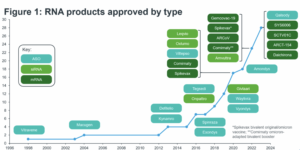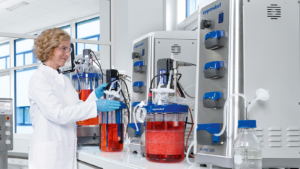
Biomanufacturing: Step up and speak up
In a world where biotechnology has been enabling products and processes for decades, it’s time to step out from behind the technology and claim the resulting products and their value in our everyday life. It needs higher visibility and recognition of impact, moving beyond its ‘enabling’ brand which forever makes it sound like the benefits are just around the corner, rather than the existing significant economic and industrial impact.
Step up ‘Biomanufacturing’. It has relevance across sectors and the language is accessible and tangible. When we speak of biomanufacturing, we speak of employment, skills, products, trade and economic growth. It perfectly fits the evolving narrative landscape for biotech. Within EuropaBio, we see biomanufacturing delivering advanced healthcare, resilient food supply chains, sustainable manufacturing across sectors…the list is a long one and it’s time to speak with a single voice. This comes at a time of critical industrial transition. Industrial processes are responding to climate change, stretched and fractured supply chains, technologies able to deliver ever more complex products and biotechnology is right in the centre.
Europe is one player amongst many in this critical industrial transition. The White House Executive Order on Advancing Biotechnology and Biomanufacturing Innovation for a Sustainable, Safe, and Secure American Bioeconomy kind of says it all really. Published in September 2022, the US aims to wire up its own complex landscape so that biomanufacturing can flourish. And the US is far from alone. China also has an innovative bioeconomy strategy and can move at a scale and speed beyond both Europe and the US.
What Europe needs, is its own joint plan for biomanufacturing. In the melee of General Pharma Legislation, Net Zero Industry Act, Novel Genomic Techniques, Taxonomy Regulation, Recovery and Resilience plans plus the 27 countries through whom these are delivered, biomanufacturing needs a focus and a strategy across sectors. We know from experience that policy can pull advanced technologies apart rather than give them the critical mass needed to bring investment for impactful outcomes. To that end, EuropaBio has launched a Biomanufacturing Platform, as an expansion of the 26-year-old association, that reflects the changing position and recognition of biotechnology through the lens of biomanufacture. It projects the activities and priorities of our members to deliver the investment and critical mass so crucial to the delivery of biomanufacturing. By the time of publication, we will have hosted our first Biomanufacturing Policy Summit, which will build visibility for biomanufacturing within European industrial and sector strategies. It marks the recognition of an important journey for Europe, one that it has already begun but needs to go faster and further, with a smooth road, clear signposts and the right destination.
Claire Skentelbery, Ph.D., a biochemist by training, has worked in the development of scientific associations for 20 years. She started her career within the UK Cambridge biotech cluster and was a co-founder of the Council of European Bio-Regions. In Brussels from 2009, she was also Secretary General for the European Biotechnology Network, working across sectors, organisations and countries as part of the mission to facilitate partnerships. Claire became Director General of the globally-focused Nanotechnology Industries Association until November 2020 when she joined EuropaBio as Director General.
This article was originally published in European Biotechnology Magazine Spring Edition 2023.




